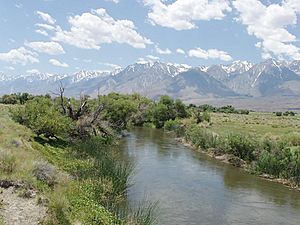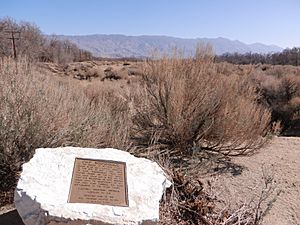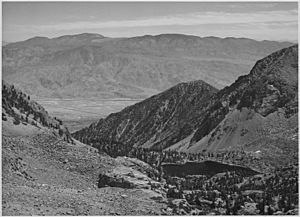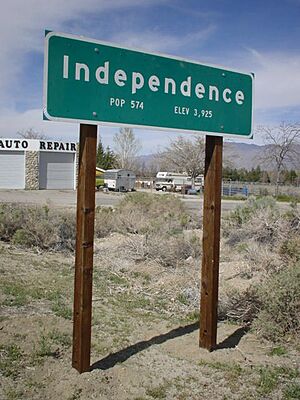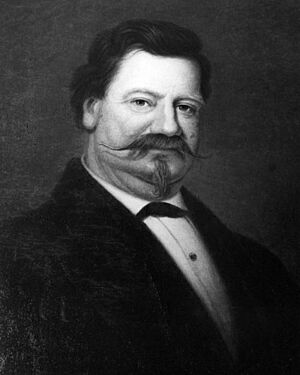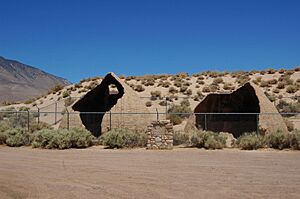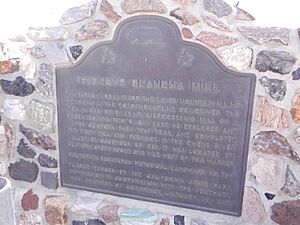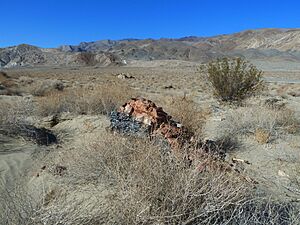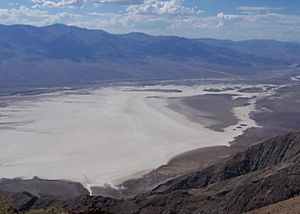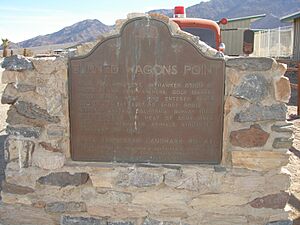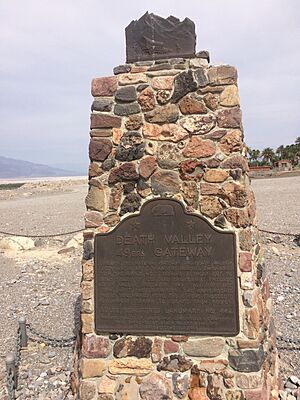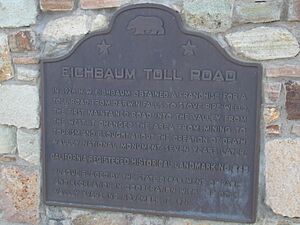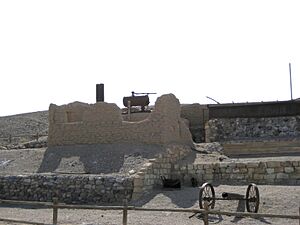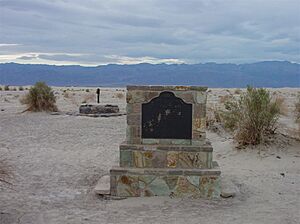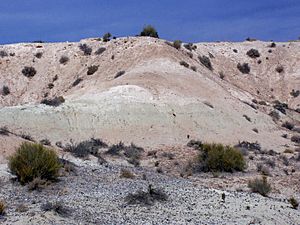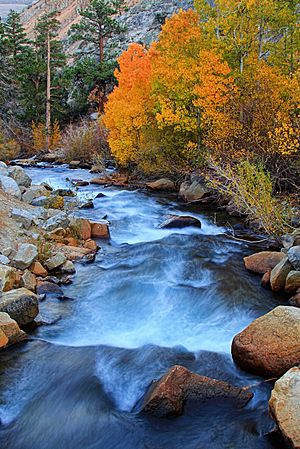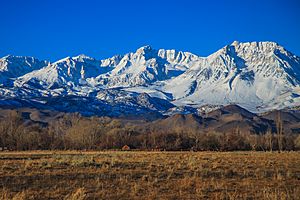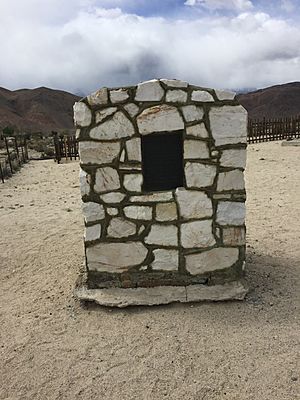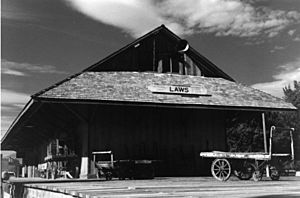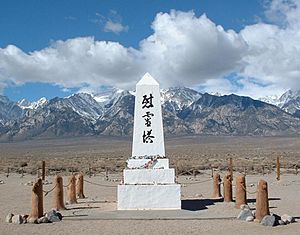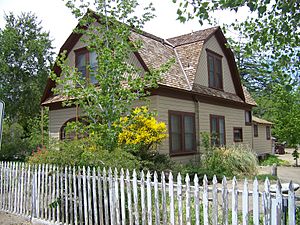California Historical Landmarks in Inyo County facts for kids
Welcome to Inyo County, California! This special place is full of amazing history, from old mining towns to important battlegrounds. Many of these historical spots are recognized as California Historical Landmarks. This means they are officially protected and remembered for their importance to California's past.
You can explore these landmarks and learn about the people and events that shaped this part of the state. From brave pioneers to significant moments in Native American history, Inyo County has many stories to tell.
Contents
Discovering Inyo County's Historical Landmarks
Inyo County is home to many fascinating historical landmarks. Each one tells a unique story about the past. Let's explore some of these important places.
Early Settlements and Pioneer Life
Many landmarks in Inyo County mark the spots where early settlers lived and worked. These places show us what life was like long ago.
Bend City
Bend City (Landmark 209) was an early settlement near Independence. It was one of the first towns in the Owens Valley. Imagine what it was like to build a new community in this rugged land!
Camp Independence
Camp Independence (Landmark 349) was a military camp established near Independence. It played a role in the interactions between settlers and Native American tribes in the area. It was an important site for keeping peace and order.
Owensville
Owensville (Landmark 230) was known as the "First Permanent White Habitation in Owens Valley." It was located near Bishop. This landmark marks the beginning of permanent settlements by pioneers in the valley.
Putnam's Stone Cabin
Putnam's Stone Cabin (Landmark 223) is in Independence. This old stone cabin reminds us of the simple, sturdy homes built by early settlers. It shows how people lived and survived in the wilderness.
San Francis Ranch
San Francis Ranch (Landmark 208) is near Bishop. This ranch was an important part of the early farming and ranching history of the area. It shows how people used the land for their livelihoods.
Mining and Industry
Inyo County was a hub for mining in the past. Many landmarks tell the story of the search for valuable minerals and the industries that grew around them.
Cottonwood Charcoal Kilns
The Cottonwood Charcoal Kilns (Landmark 537) are near Cartago. These large, beehive-shaped structures were used to make charcoal. Charcoal was essential for smelting (melting) ore from nearby mines.
Farley's Olancha Mill Site
Farley's Olancha Mill Site (Landmark 796) is located near Olancha. This was once a mill where minerals were processed. It played a key role in the mining operations of the region.
Furnace of Owens Lake Silver-Lead Company
The Furnace of Owens Lake Silver-Lead Company (Landmark 752) is near Keeler. This furnace was used to process silver and lead from local mines. It was a major industrial site in its time.
Death Valley's Tough History
Death Valley National Park is famous for its extreme conditions. Several landmarks there tell stories of survival and hardship.
Bennett-Arcane Long Camp
The Bennett-Arcane Long Camp (Landmark 444) is just west of the Badwater Basin in Death Valley National Park. This was a crucial stopping point for a group of pioneers, the "49ers," who were stranded in Death Valley in 1849. They camped here for a long time, trying to find a way out.
Burned Wagons Point
Burned Wagons Point (Landmark 441) is also in Death Valley National Park, near Stovepipe Wells. This spot marks where some of the 49ers had to abandon and burn their wagons. They did this to lighten their load and survive the harsh desert.
Death Valley 49ers Gateway
The Death Valley 49ers Gateway (Landmark 442) is located near Furnace Creek. This landmark honors the brave 49ers who passed through Death Valley during the California Gold Rush. It reminds us of their incredible journey.
Eichbaum Toll Road
The Eichbaum Toll Road (Landmark 848) is in Death Valley National Park, near Stovepipe Wells. This road was built to make travel easier through the tough desert terrain. It helped miners and travelers reach their destinations.
Old Harmony Borax Works
The Old Harmony Borax Works (Landmark 773) is in Death Valley National Park, near Furnace Creek. This site was once a busy factory where borax, a mineral, was processed. It's famous for the "20 Mule Teams" that hauled the borax out of the valley.
Old Stovepipe Wells
Old Stovepipe Wells (Landmark 826) is in Death Valley National Park, near Stovepipe Wells. This was a natural water source that became a vital stop for travelers crossing Death Valley. It was named for a stovepipe used to mark the well.
Valley Wells
Valley Wells (Landmark 443) is another important water source in the desert. It's located near Valley Wells. For centuries, this spot provided water for travelers and animals in a very dry region.
Important Battles and Conflicts
Inyo County also has sites that mark historical conflicts, reminding us of the challenges faced by different groups.
Bishop Creek Battleground
The Bishop Creek Battleground (Landmark 811) is near Bishop. This site marks a battle that took place during a period of conflict between settlers and Native Americans in the Owens Valley.
Mayfield Canyon Battlefield
The Mayfield Canyon Battlefield (Landmark 211) is located in Mayfield Canyon, near Bishop. This was another site of conflict during the early settlement of the region.
Other Significant Landmarks
Grave of 1872 Earthquake Victims
The Grave of 1872 Earthquake Victims (Landmark 507) is near Lone Pine. This grave marks the resting place of people who died in a massive earthquake that struck the Owens Valley in 1872. It was one of the largest earthquakes in California's history.
Laws Station
Laws Station (Landmark 953) is near Bishop. This was a station on the old Carson and Colorado Railroad. It was a vital link for transporting goods and people in the Owens Valley. Today, it's a museum!
Manzanar Relocation Center
The Manzanar Relocation Center (Landmark 850) is near Independence. During World War II, this was one of ten camps where Japanese Americans were forced to live. It is a very important site for remembering a difficult time in American history. It is also on the National Register of Historic Places.
Mary Austin's Home
Mary Austin's Home (Landmark 229) is in Independence. Mary Austin was a famous American writer who lived here. She wrote about the landscape and people of the American Southwest, especially the Owens Valley.
Images for kids
 | Leon Lynch |
 | Milton P. Webster |
 | Ferdinand Smith |


